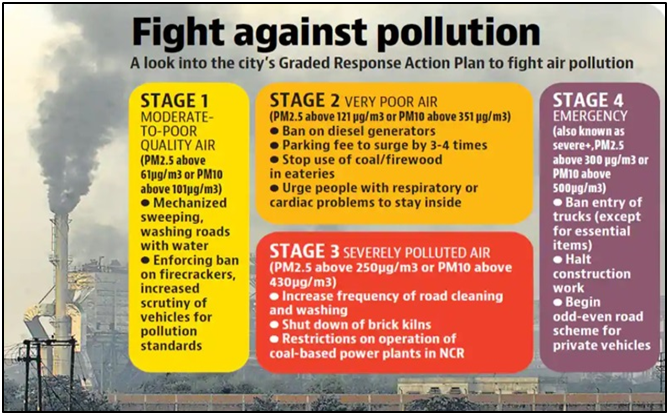Why in news?
- The Commission for Air Quality Management (CAQM) invoked measures under Stage 4 of the Graded Response Action Plan (GRAP) with immediate effect.
- This was invoked after the National Capital Region’s Air Quality Index (AQI) deteriorating to the ‘severe’ category.
What’s in today’s article?
- Graded Response Action Plan
- Commission for Air Quality Management (CAQM)
- News Summary
Graded Response Action Plan
- About
- GRAP is a set of emergency measures that kick in to prevent further deterioration of air quality once it reaches a certain threshold in the Delhi-NCR region.
- It was approved by the Supreme Court in 2016 and notified in 2017.
- The plan was formulated after several meetings between Environment Pollution (Prevention and Control) Authority (EPCA), state government and experts.
- GRAP works only as an emergency measure.
- The plan does not include action by various state governments to be taken throughout the year to tackle industrial, vehicular and combustion emissions.
- Nature

- GRAP is incremental in nature and thus, when the air quality dips from ‘poor’ to ‘very poor,’ measures listed under both sections have to be followed.
- Stage 1 of GRAP is activated when the AQI is in the ‘poor’ category (201 to 300);
- Stage 2 is when it’s in the ‘Very poor’ category (301-400);
- Stage 3 is when the AQI is the ‘Severe’ category (401-450); and
- Stage 4 is when it rises to the ‘Severe +’ category (more than 450).
Commission for Air Quality Management (CAQM)
- CAQM is a statutory body formed under the Commission for Air Quality Management in National Capital Region and Adjoining Areas, Act 2021.
- The commission aims at better coordination, research, identification, and resolution of problems related to air quality in NCR and adjoining areas.
News Summary: GRAP Stage 4 implemented in Delhi-NCR amid severe air pollution
- The Commission for Air Quality Management (CAQM) implemented Stage IV of the Graded Response Action Plan (GRAP) in Delhi-NCR.
- The decision was made to curb air pollution and prevent further deterioration of air quality.
What measures does GRAP Stage 4 entail?
- A central panel directed authorities to prohibit the use of diesel four-wheelers that are not BS-VI compliant, as well as the entry of trucks in Delhi.
- The BS or Bharat Stage emission standards are instituted by the government to regulate the output of air pollutants from motor vehicles from internal combustion engine equipment.
- The BS-VI fuel was estimated to bring around an 80% reduction of sulphur, from 50 parts per million to 10 ppm.
- Petrol cars can continue to ply as usual.
- Construction and demolition activities, including those on linear public projects like highways, roads, flyovers, pipelines and power lines, which were previously allowed to continue, will also be banned.
- The state governments in the NCR may decide to discontinue physical classes for classes 6 to 9 and class 11, and conduct lessons online.
- Moreover, the governments may also decide on whether to allow public, private, and municipal offices to work on 50% strength.
- State governments may also consider other emergency measures like closure of colleges and other educational institutions, and closure of non-emergency commercial activities, permitting vehicles to run on an odd-even basis.
- The central government may make an appropriate decision on permitting work from home for employees working in central government offices.










